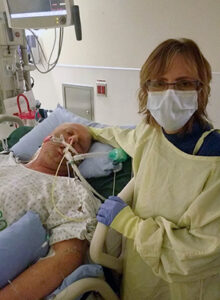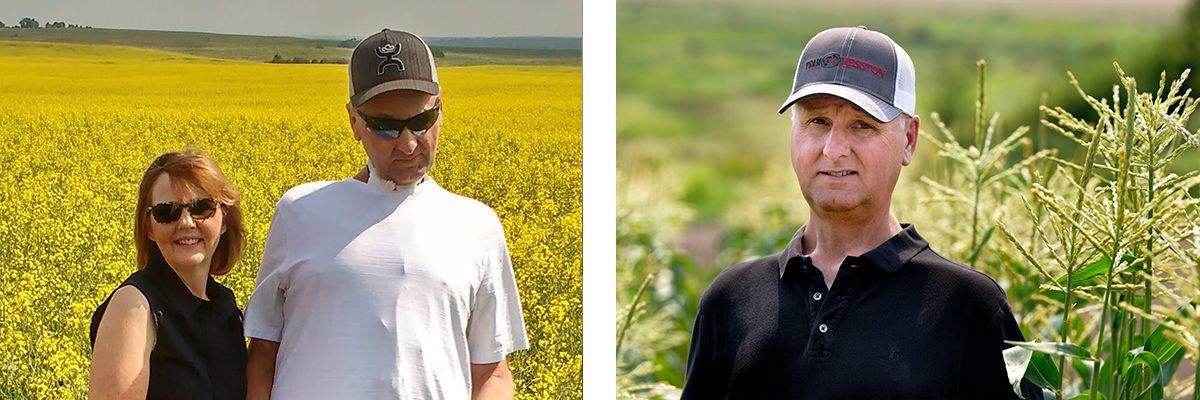On March 27, 2019, Rick expected to wake up and tackle another day’s work on their family’s farm. Instead, when he tried eating some lunch, he was not able to lift his neck to eat and was not able to lift the spoon to feed himself his soup. What began as a mild concern and a quick trip from their farm in rural Alberta to the hospital in Hanna, quickly escalated into a life-threatening emergency. Within 12 hours Rick and his wife, Kathy, found themselves in the Red Deer hospital undergoing tests for what initially appeared to be a stroke. But, when things weren’t adding up, Rick was rushed to Calgary for an MRI and quickly admitted to the Intensive Care Unit (ICU) at Foothills Medical Centre. He was placed under the care of the neurocritical care team, who could monitor Rick’s brain activity and begin a deep investigation of what was happening to Rick before it was too late.

What started as an inability to lift his head, rapidly evolved to being unable to swallow or raise either of his arms. His internal organs appeared to be shutting down. Rick lost the ability to walk, eat on his own and verbally communicate.
In the few precious minutes before Rick had to be intubated, he let Kathy know that he would give her and his two sons an “okay” sign with his hand to tell them he loved them. When Rick was finally able to, he gave the “okay” sign to his sons.
What Dr. Kromm and her team began to realize was that Rick was suffering from a virus, Enterovirus D 68 Acute Flaccid Paralysis, an extremely rare condition in adults that usually only presents itself in children. Rick would remain in the ICU at Foothills Medical Centre for eight weeks as Dr. Kromm and her team began treatment to fight the virus that was attacking Rick’s nervous system.
Approximately 900 patients every year are admitted to ICUs with life-threatening nervous system disorders in southern Alberta. These disorders represent between 15 to 20 percent of the patients being cared for in ICU environments. This includes patients with acute brain, spinal cord, nerve and muscle injuries from trauma, strokes, cardiac arrests, seizures, infections, and other conditions. Without the support of the neurocritical care team at Foothills Medical Centre, patients like Rick likely will not have the same positive outcome.
Neurocritical care is a novel field of medicine that has recently emerged out of worldwide research, including studies from southern Alberta, showing that neurocritical care saves lives and is an essential link to the chain of survival and recovery after facing neurological injuries.
Rick had a long road of recovery that saw him needing to learn to walk and even eat again. Rick required a tracheotomy to breathe and a feeding tube to ensure he was receiving the nutrients he needed. He lived with his tracheotomy for almost three years but was able to have it removed in early 2022.
Today, Rick continues to make progress and fully enjoy his life, his family and even new adventures in their fifth wheel.
Life instantly changed for Rick and Kathy that March, but their gratitude for each and every day is evident throughout their journey as they valued the time they had – even though it was uncertain. Their appreciation of the medical team at Foothills Medical Centre, from their respiratory technician to their nurses, doctors and every caregiver who made them feel heard and worked so hard to save Rick’s life, is beyond words.
“When doing rounds, Julie (Dr. Kromm) and her team would ask me for my thoughts. I was blown away by how included I was in the process, how approachable and warm everyone was. There were little things that the team did every step of the way to make our experience personal and meaningful.
Our youngest son was graduating from High School in June and Rick had to miss it. This was a difficult time for us but one of our nurses helped us through by reminding us that they were working towards getting Rick to future weddings and holding his future grandbabies.
Rick has already been able to enjoy our oldest son’s wedding, thanks to the team at Foothills.” – Kathy Weich
“If you need the level of acute care that I found myself needing, you could not be in better hands than the Foothills team.” – Rick Weich

Rick’s goal was to get home to see his yellow Canola fields in bloom. After almost four months in hospital, Rick was able to return home to the land that he loved, and the first thing he did was pose for a picture with Kathy and their canola field!


